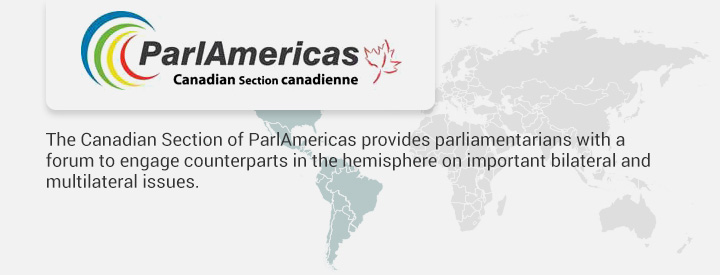Activities and Reports
Refine your search
Results: 81 - 90 of 238
November 13, 2020
Latin American and Caribbean Countries: A Briefing Session on their Relationships with Canada and Update on the Challenges they Face Due to the COVID-19 Pandemic
By videoconference
Canadian Section of ParlAmericas (CPAM)
GAC officials provided information about the ways in which various countries in the western hemisphere are managing the challenges caused by the COVID-19 pandemic. They also outlined some of the Government of Canada's trade considerations and international development projects in countries in the hemisphere, and described the ways in which Canada has been applying a "COVID-19 lens" to assess how best to support countries as they address the pandemic while continuing to focus on previously identified priorities in each country, such as advancing the equality of women and men, or enhancing trade.
Officials from GAC and members of the Canadian Section discussed governance, trade, investment and environmental issues, as well as future actions that the Canadian Section could take in engaging with other parliamentarians in the western hemisphere.
October 30, 2020
Annual Reception
By videoconference
Canadian Section of ParlAmericas (CPAM)
Mr. Marc Serré, M.P., Chair of ParlAmericas’ Canadian Section, and Her Excellency Sofia Lastenia Cerrato Rodriguez, Ambassador of Honduras to Canada and Dean of the Latin America Group of Ambassadors, co-hosted the reception. Others attending from the Canadian Section were Senator Rosa Galvez, Vice-Chair of the Canadian Section and Vice-President (North America) of ParlAmericas' Parliamentary Network on Climate Change (PNCC), Ms. Julie Dzerowicz, M.P., Vice-Chair of the Canadian Section, Mr. Stéphane Bergeron, M.P., Ms. Stephanie Kusie, M.P., Ms. Soraya Martinez Ferrada and Mr. Robert Oliphant, M.P., all of whom made remarks to the participants.
Representatives of the following countries attended the reception: Argentina, Bolivia, Brazil, Chile, Colombia, Costa Rica, Cuba, the Dominican Republic, Ecuador, Guatemala, Honduras, Mexico, Panama, Paraguay and Peru.
Mr. Serré outlined some of the activities in which the Canadian Section of ParlAmericas has been involved since the beginning of the COVID-19 pandemic. Senator Galvez highlighted that the pandemic has affected people differently, depending on such factors as age, gender and sector of employment. Some foreign participants expressed their gratitude for Canadian parliamentarians’ efforts to support their countries during the pandemic. Others discussed the strong ties between Canada and the countries in the western hemisphere, and said that they look forward to future opportunities to gather and to get to know each other better, ideally in person.
October 2, 2020
12th Gathering of ParlAmericas Gender Equality Network (plenary session)
By videoconference
Canadian Section of ParlAmericas (CPAM)
For more information, see the report: Report of the Canadian Section of ParlAmericas
September 23, 2020
12th Gathering of ParlAmericas Gender Equality Network (working session)
By videoconference
Canadian Section of ParlAmericas (CPAM)
September 11, 2020
51st Meeting of the Board of Directors of ParlAmericas
By videoconference
Canadian Section of ParlAmericas (CPAM)
July 22, 2020
Gender-Responsiveness and Disaster Resilience During the COVID-19 Crisis
By videoconference
Canadian Section of ParlAmericas (CPAM)
Gale Rigobert, St. Lucia’s Minister for Education, Innovation, Gender Relations and Sustainable Development, welcomed everyone to the meeting, following which Tonni Brodber, Acting Head of Office at the UN Women Multi-Country Office for the Caribbean, Andy Daniel, Speaker of St. Lucia’s House of Assembly, and Elizabeth Cabezas, President of ParlAmericas and a member of Ecuador’s National Assembly, provided opening remarks. Ms. Rigobert also moderated a session during which presentations on the topic of gender inequality in disaster and crisis situations were made by: Angie Dazé, Senior Policy Advisor at the International Institute for Sustainable Development (IISD); Kyana Bowen, Programme Officer at the UN Women Multi-Country Office for the Caribbean; and Elizabeth Riley, Acting Executive Director of the Caribbean Disaster Emergency Management Agency (CDEMA).
Ms. Dazé explained that gender interacts with other factors – including age, disability, ethnicity and sexual orientation – to influence people's vulnerability to climate change and disasters. She outlined three components of a gender-responsive approach to building climate and disaster resilience: a recognition of gender differences in needs and capacities for managing climate and disaster risks; gender-equitable participation and influence in planning and decision-making processes; and gender-equitable access to financial servicese. Finally, Ms. Dazé presented some of the IISD's work relating to gender-responsiveness, climate change and disaster risk management.
Ms. Bowen described some ways in which disaster-preparedness planning and response can be gender-transformative, leading to lasting changes in gender norms. She noted that, when compared to most other parts of the world, the Caribbean is subject to more natural hazards, such as hurricanes, floods, sea level changes, drought and earthquakes. Ms. Bowen also discussed the ways in which planning for such hazards can be gender-transformative at the home, community, national and regional levels. Finally, she summarized some of the UN Women Multi-Country Office for the Caribbean's responses to the COVID-19 pandemic.
Ms. Riley outlined various types of hazards that are common in the Caribbean region, including earthquakes, storm surges, flooding and volcanic eruptions. She underscored that the number of Atlantic hurricanes in 2020 is already higher than normal, and that – with the additional challenges resulting from the pandemic – countries face a complex, multi-hazard scenario that will make disaster response more difficult. Ms. Riley explained that, as an agency of the Caribbean Community, CDEMA supports countries in their efforts to mobilize and coordinate disaster relief, among other things. She described the impacts of climate change in the Caribbean region, and highlighted a rise in the intensity of tropical storms and the damage they cause. Ms. Riley also emphasized the importance of resilience, and stated that CDEMA considers gender to be a cross-cutting theme in all of its work. Finally, she commented on the number of cases of COVID-19 in the region and discussed ways in which the Caribbean could deal with hurricane season in the context of the pandemic.
Following the presentations, several participants spoke briefly about some resources that parliamentarians may wish to use when addressing issues of gender equality, climate change and disaster risk reduction. Jack Hardcastle, Program Assistant at the Secretariat to the Commonwealth Parliamentary Association (CPA), noted a climate change toolkit designed specifically for small island states that the CPA has published.
Speaker Daniel presented two publications: COVID-19: An Analysis of the Legislative Agenda and the Centering of Gender Equality in Legislative Responses, co-authored by ParlAmericas and Directorio Legislativo; and the Parliamentary Protocol for Disaster Risk Reduction and Climate Change Adaptation, authored by ParlAmericas.
Massimiliano Tozzi, Project Manager at the United Nations Development Programme, commented on the project “Enabling Gender-Responsive Disaster Recovery, Climate and Environmental Resilience in the Caribbean (EnGenDER).” He said that the project aims to ensure that actions relating to climate change and disaster risk reduction are informed by an analysis of gender inequalities, and are designed to alleviate existing inequalities.
Following a discussion in which participants shared their countries’ best practices regarding gender-responsiveness and disaster resilience, Ms. Brodber and Chester Humphrey, Vice-President (Caribbean) of ParlAmericas’ Parliamentary Network for Gender Equality and President of Grenada’s Senate, gave closing remarks.
July 10, 2020
Build Back Better: A Green and Sustainable Economic Recovery - By videoconference - Canadian Section of ParlAmericas (CPAM)
Diego Paulsen, President of Chile’s Chamber of Deputies, and Elizabeth Cabezas, President of ParlAmericas and a member of Ecuador’s National Assembly, provided welcoming remarks. Ana Belén Marín, President of ParlAmericas’ PNCC and a member of Ecuador’s National Assembly, moderated a session at which the following individuals made presentations: Leo Heileman, Regional Director of the Latin America and the Caribbean Office of the United Nations Environment Programme (UNEP); Raúl Salazar, Head of the United Nations Office for Disaster Risk Reduction Regional Office for the Americas and the Caribbean; and Brian O’Callaghan, a researcher at the University of Oxford’s Smith School for Enterprise and the Environment.
Mr. Heileman began by noting the high number of zoonotic diseases that have emerged in recent years, attributing their increased frequency to human impacts on the natural environment. In characterizing climate change as a larger crisis than COVID-19, he suggested that now is the time to "reactivate" the economy, generate “decent” work and try to meet the needs of the most vulnerable groups. Mr. Heileman outlined several areas that UNEP has identified as having the potential to help reactivate the economy while benefitting the climate. These include: rural, agricultural and ecosystem resilience; urban resilience; renewable energy and energy efficiency; and the transition to electric vehicles and e-mobility.
Mr. Salazar spoke about the double impact of COVID-19 and climate disasters – such as heavy rain, powerful tropical storms and droughts that are more intense, frequent and widespread – in numerous countries in the western hemisphere. In his view, governments must take an integrated, intersectional approach to risk management. He also described actions that could reduce vulnerability and enhance resilience in general, and outlined some roles for parliaments in applying disaster risk reduction approaches and supporting investments in climate change adaptation.
Mr. O’Callaghan summarized the results of his recent study on the possible benefits of a "clean" recovery from the COVID-19 pandemic; the study was based on a review of stimulus policies from the 2009 global financial crisis and a survey of more than 230 economists from the G20 countries. His study concluded that climate-related spending could enhance economic growth during the recovery from the pandemic. Mr. O’Callaghan emphasized the importance of using stimulus spending to achieve long-term climate objectives and not just short-term gross domestic product growth.
Paola Vega, Vice-President (Central America) of ParlAmericas’ PNCC Change and a member of Costa Rica’s Legislative Assembly, gave closing remarks.
June 22, 2020
Joint Briefing on Venezuela hosted by the International Secretariat of ParlAmericas
By videoconference
Canadian Section of ParlAmericas (CPAM)
During the first panel, Global Affairs Canada (GAC) officials highlighted – among other topics – that the humanitarian situation in Venezuela was worsening and that, by June 2020, more than 5 million Venezuelans had left their home country and 7 million people within Venezuela needed humanitarian aid. They also noted the Government of Canada’s continued engagement with partners in Venezuela and internationally to find solutions to the situation in Venezuela, and the Government’s contribution of $27 million for humanitarian aid to support Venezuelan refugees and migrants.
During the second panel, Eduardo Stein – Joint Special Representative for Venezuelan refugees and migrants with the International Organization for Migration and the Office of the United Nations High Commissioner for Refugees – mentioned that, of the 5.1 million Venezuelan refugees and migrants, 4.3 million are hosted in Latin American countries. According to him, during the COVID-19 pandemic, Venezuelan refugees and migrants have been highly vulnerable to discrimination and violence, and – as of June 2020 – about 70,000 Venezuelan refugees and migrants had returned to their home country. Ben Rowswell – President of the Canadian International Council and former Canadian Ambassador to Venezuela – stated that, although addressing the humanitarian situation is currently the most important issue in Venezuela, the international community must continue to request free and fair elections in that country in 2020.
Results: 81 - 90 of 238 — Page: 9 of 24


